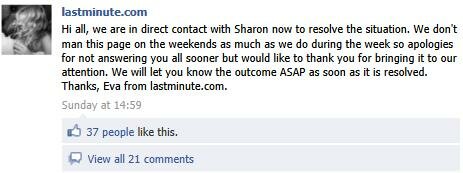The past weekend showed that many consumers these days have the expectation that if brands are on Facebook they’re offering customer service 24/7.
Lastminute.com case study
From what I can gather, at some stage over the weekend a woman posted to the saying her son, who’s serving in Afghanistan, had booked a trip via Lastminute.com for his R&R. When his leave was changed – through no fault of his own – Lastminute denied his request to change the dates of travel or get a refund.
The page erupted in Posts, Comments and Likes berating the company for the response. But on the flipside there were also a host of fans feeling the response from users of the page was getting a little too extreme, unrealistically expecting the Page admin to sort it out, and was moving faster than the brand could resolve – all on a Sunday afternoon.
While common sense suggests the company could’ve made an exception in the privacy of their own Customer Service centre the first time round, it does remind us that Social Media sites frequently bear the burden of resolving Customer Service issues, with Facebook a platform of choice.
I usually advise respond fast even if it’s just to say ‘Ok, we hear you’ and Lastminute.com DID do that, but it just took them a little longer than usual by their own admission because it kicked off on a weekend when they don’t man the page as regularly.
So what can we learn about Facebook and Customer Service?
- With Facebook, customer service is now 24/7: You can switch off your call centre but it’s not that easy with Social Media. We wouldn’t advocate every Page needs weekend cover but our ‘Best times to update Facebook’ post shows weekends are exactly when people get vocal and issues can become more visible. Is your brand prepared to risk it?
- Social Media marketing & customer services are now one and the same: An official brand account is a potential place to complain in the eyes of the consumer. Connect your Customer Service to your overall Social Media strategy or at least have an open channel to get them involved if you need to
- The Social Media customer is not always right: It can be terrifying to be the target of 100s of customer complaints in a fast moving and public environment like Facebook. But just because they’re on your page, doesn’t mean they’re a genuine/rational customer. Trolls are still trolls. If your T&Cs ban the use of offensive or abusive language then follow the processes to manage that. There’s two reasons for this a) you risk annoying your geniune fans by letting an angry mob take over their community b) you have a duty of care to protect staff managing the page from abuse, libel, or breach of privacy
- Don’t delete content willy nilly: Having an escalation procedure and telling users what is and isn’t acceptable behaviour is essential BEFORE a problem occurs. A crisis situation is not the right time to be debating what should & shouldn’t be removed and justifying it to users. Neither should you delete content without following best practice. I’m not sure why but I couldn’t find what looked like the original complaint post on the page – was it deleted initially? Or did the mother post a link to the page from somewhere else and encourage support?









Hi Darika,
Really great to hear your thoughts on this. As you say, on Sunday, we were alerted to a customer service issue via Facebook. We immediately tried to get in contact with the customer and are pleased to say that the issue has now been resolved and the customer is happy with the outcome.
I agree with the key points you make in your article, and we’re making changes to our monitoring policy over weekends and out of office hours to make sure we get back to our customers as quickly as possible. Great to hear you agree our response was ‘best practice’ – our aim with social media is to always be upfront, honest and quick to help our customers.
Thanks again for your thoughts, and great to hear you support how we handled this issue,
Alex from lastminute.com